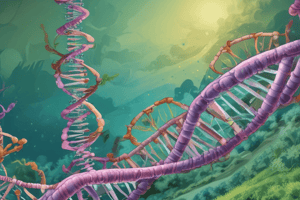Podcast
Questions and Answers
What is the primary difference between innate immunity and adaptive immunity?
What is the primary difference between innate immunity and adaptive immunity?
- Innate immunity provides a specific response while adaptive immunity is non-specific.
- Innate immunity offers a rapid non-specific response, while adaptive immunity is specific and develops over time. (correct)
- Innate immunity targets specific pathogens, whereas adaptive immunity reacts to any foreign substance.
- Innate immunity develops over time through exposure to pathogens, while adaptive immunity is present from birth.
Which of the following cell types is primarily involved in adaptive immunity?
Which of the following cell types is primarily involved in adaptive immunity?
- Phagocytes
- Dendritic cells
- B cells (correct)
- Natural killer cells
What do T cells and B cells recognize in the context of adaptive immunity?
What do T cells and B cells recognize in the context of adaptive immunity?
- Microorganisms as a whole
- Self-antigens only
- Specific antigens of pathogens (correct)
- Physical barriers like skin
What role do phagocytes play in the immune system?
What role do phagocytes play in the immune system?
What is a critical feature of the immune response in distinguishing between self and non-self?
What is a critical feature of the immune response in distinguishing between self and non-self?
What is the primary function of antibodies produced by B cells?
What is the primary function of antibodies produced by B cells?
How do vaccines support the immune system?
How do vaccines support the immune system?
What occurs during an autoimmune disease?
What occurs during an autoimmune disease?
What is immunological tolerance?
What is immunological tolerance?
What is the goal of immunotherapy in treating diseases like cancer?
What is the goal of immunotherapy in treating diseases like cancer?
Flashcards
Biotechnology definition
Biotechnology definition
Using biological systems, organisms, or derivatives to make products or develop technology
Genetic engineering
Genetic engineering
Modifying an organism's genes to enhance traits or create new ones. Often uses foreign DNA.
Immunology definition
Immunology definition
Study of how the body fights off foreign invaders (like germs).
Innate immunity
Innate immunity
Signup and view all the flashcards
Adaptive immunity
Adaptive immunity
Signup and view all the flashcards
Antibody function
Antibody function
Signup and view all the flashcards
Vaccine purpose
Vaccine purpose
Signup and view all the flashcards
Immunodeficiency
Immunodeficiency
Signup and view all the flashcards
Autoimmune disease
Autoimmune disease
Signup and view all the flashcards
Immunological tolerance
Immunological tolerance
Signup and view all the flashcards
Study Notes
Biotechnology
- Biotechnology utilizes biological systems, organisms, or derivatives thereof, to develop or make products, or any technological application that uses biological systems, living organisms, or derivatives thereof.
- It encompasses a wide range of disciplines, including genetic engineering, cell culture, and bioremediation.
- Applications of biotechnology span various sectors, such as medicine, agriculture, and industry.
- Genetic engineering involves manipulating an organism's genes to introduce new traits or modify existing ones, often by inserting foreign DNA into the host organism's genome, with potential to enhance crops, develop pharmaceuticals, or provide gene therapy.
- Recombinant DNA technology is central to genetic engineering, allowing scientists to combine DNA fragments from different sources.
- Tools for biotechnology include restriction enzymes that cut DNA at specific sequences, plasmids that serve as vectors to carry foreign DNA into host organisms, and polymerase chain reaction (PCR) to amplify DNA sequences.
- Cell cultures can be used to produce specific proteins and pharmaceuticals.
- Bioremediation utilizes microorganisms to clean up pollutants or contaminants in the environment.
- Advantages include enhanced crop yields, improved disease resistance, and cost-effectiveness in some industrial processes.
- Applications in medicine include the production of hormones, antibiotics, and vaccines.
- Ethical concerns regarding genetically modified organisms (GMOs) include potential impacts on biodiversity, health risks, and socio-economic implications.
Immunology
- Immunology is the study of the immune system's response to foreign substances, such as microorganisms and toxins.
- The immune system comprises different cell types and molecules that cooperate to identify and eliminate pathogens.
- The immune response involves recognition of self vs. non-self, allowing the system to target invaders while avoiding harm to the host.
- Innate immunity is the body's first line of defense, providing rapid non-specific responses to pathogens.
- Key components include physical barriers, such as skin and mucous membranes, and cellular defenses like phagocytes.
- Adaptive immunity is a specific and targeted response that develops over time through exposure to various pathogens.
- Lymphocytes, particularly T cells and B cells, are involved in adaptive immunity.
- T cells and B cells recognize specific antigens of pathogens and mount a targeted attack.
- Antibodies, produced by B cells, bind to antigens and neutralize or eliminate pathogens.
- Vaccines stimulate adaptive immunity by exposing the body to weakened or inactive forms of pathogens.
- Vaccination generates immunological memory, equipping the body to respond more effectively to future encounters with the same pathogen.
- Immunodeficiency disorders occur when the immune system's ability to fight off pathogens is compromised.
- Autoimmune diseases occur when the immune system mistakenly attacks the body's own tissues, leading to chronic inflammation and damage.
- Allergic reactions are heightened immune responses to harmless substances, leading to symptoms like inflammation and swelling.
- Immunological tolerance involves mechanisms that prevent the immune system from attacking the body's own cells, contributing to overall health.
- Immunotherapy leverages the principles of immunology to treat diseases, such as cancer, with the aim of boosting the immune response against tumor cells.
Studying That Suits You
Use AI to generate personalized quizzes and flashcards to suit your learning preferences.




